
Question Number 2820 by Yozzis last updated on 27/Nov/15
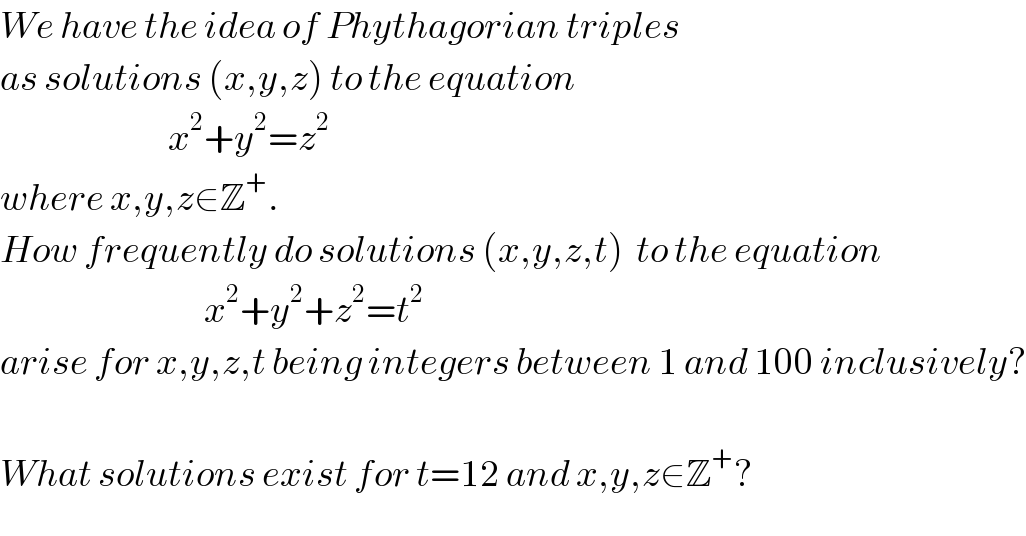
$${We}\:{have}\:{the}\:{idea}\:{of}\:{Phythagorian}\:{triples} \\ $$$${as}\:{solutions}\:\left({x},{y},{z}\right)\:{to}\:{the}\:{equation} \\ $$$$\:\:\:\:\:\:\:\:\:\:\:\:\:\:\:\:\:\:\:\:\:\:\:\:\:\:\:\:{x}^{\mathrm{2}} +{y}^{\mathrm{2}} ={z}^{\mathrm{2}} \\ $$$${where}\:{x},{y},{z}\in\mathbb{Z}^{+} .\: \\ $$$${How}\:{frequently}\:{do}\:{solutions}\:\left({x},{y},{z},{t}\right)\:\:{to}\:{the}\:{equation} \\ $$$$\:\:\:\:\:\:\:\:\:\:\:\:\:\:\:\:\:\:\:\:\:\:\:\:\:\:\:\:\:\:\:\:\:\:{x}^{\mathrm{2}} +{y}^{\mathrm{2}} +{z}^{\mathrm{2}} ={t}^{\mathrm{2}} \\ $$$${arise}\:{for}\:{x},{y},{z},{t}\:{being}\:{integers}\:{between}\:\mathrm{1}\:{and}\:\mathrm{100}\:{inclusively}? \\ $$$$ \\ $$$${What}\:{solutions}\:{exist}\:{for}\:{t}=\mathrm{12}\:{and}\:{x},{y},{z}\in\mathbb{Z}^{+} ? \\ $$
Commented by prakash jain last updated on 27/Nov/15

$$\mathrm{Out}\:\mathrm{of}\:\mathrm{30}\:\mathrm{number}\:\mathrm{I}\:\mathrm{considered}\:\mathrm{18}\:\mathrm{came}\:\mathrm{with} \\ $$$$\mathrm{a}\:\mathrm{solution}.\:\mathrm{Some}\:\mathrm{with}\:\mathrm{more}\:\mathrm{than}\:\mathrm{1}. \\ $$$$\mathrm{What}\:\mathrm{exactly}\:\mathrm{are}\:\mathrm{looking}\:\mathrm{for}\:\mathrm{in}\:\mathrm{solution}. \\ $$
Commented by Yozzis last updated on 28/Nov/15

$${I}\:{was}\:{thinking}\:{sonething}\:{like}\:{the}\:{prime} \\ $$$${density}\:{function}\:\frac{\pi\left({N}\right)}{{N}}\:{but}\:{instead} \\ $$$${call}\:{something}\:{the}\:{solution}\:{density}\:{function}\:\frac{\eta\left({N}\right)}{{N}} \\ $$$${where}\:\eta\left({N}\right)\:{is}\:{the}\:{number}\:{of}\:{solutions}\:\left({x},{y},{z},{t}\right) \\ $$$${for}\:\mathrm{1}\leqslant{x},{y},{z},{t}\leqslant{N}\:,\:{N}\in\mathbb{N}.\: \\ $$$${So},\:{if}\:{N}=\mathrm{2}\:{for}\:{example},\:\eta\left(\mathrm{2}\right)=\mathrm{0}\:{since} \\ $$$${there}\:{are}\:{is}\:{solution}\:\left({x},{y},{z},{t}\right)\:{with}\:{x},{y},{z},{t} \\ $$$${each}\:{taking}\:{either}\:\mathrm{1}\:{or}\:\mathrm{2}\:{only}. \\ $$$${So},\frac{\eta\left({N}\right)}{{N}}=\frac{\mathrm{0}}{\mathrm{2}}=\mathrm{0}.\: \\ $$$${In}\:{my}\:{question}\:{N}=\mathrm{100}. \\ $$
Commented by Yozzis last updated on 27/Nov/15

$${If}\:{we}\:{consider}\:{distinct}\:{solutions}\:\frac{\eta\left({N}\right)}{{N}}\:{is}\:{better}\:{defined} \\ $$$${I}\:{think}. \\ $$
Commented by prakash jain last updated on 27/Nov/15
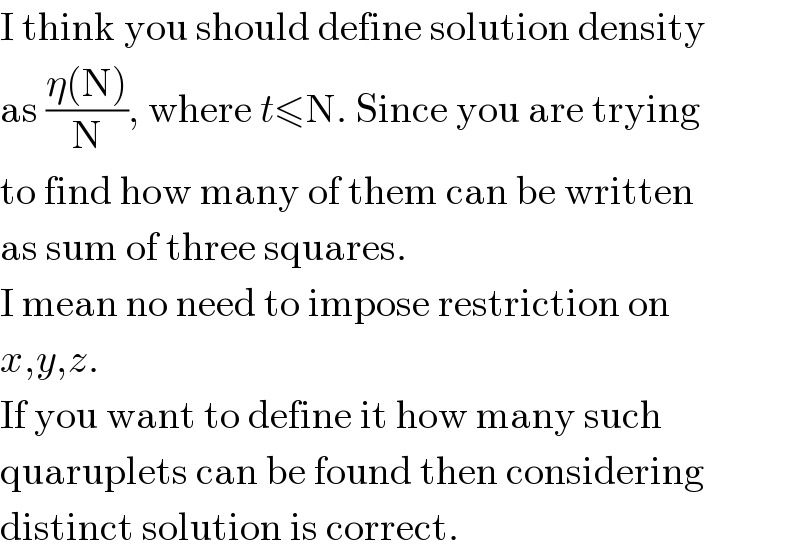
$$\mathrm{I}\:\mathrm{think}\:\mathrm{you}\:\mathrm{should}\:\mathrm{define}\:\mathrm{solution}\:\mathrm{density} \\ $$$$\mathrm{as}\:\frac{\eta\left(\mathrm{N}\right)}{\mathrm{N}},\:\mathrm{where}\:{t}\leqslant\mathrm{N}.\:\mathrm{Since}\:\mathrm{you}\:\mathrm{are}\:\mathrm{trying} \\ $$$$\mathrm{to}\:\mathrm{find}\:\mathrm{how}\:\mathrm{many}\:\mathrm{of}\:\mathrm{them}\:\mathrm{can}\:\mathrm{be}\:\mathrm{written} \\ $$$$\mathrm{as}\:\mathrm{sum}\:\mathrm{of}\:\mathrm{three}\:\mathrm{squares}. \\ $$$$\mathrm{I}\:\mathrm{mean}\:\mathrm{no}\:\mathrm{need}\:\mathrm{to}\:\mathrm{impose}\:\mathrm{restriction}\:\mathrm{on} \\ $$$${x},{y},{z}. \\ $$$$\mathrm{If}\:\mathrm{you}\:\mathrm{want}\:\mathrm{to}\:\mathrm{define}\:\mathrm{it}\:\mathrm{how}\:\mathrm{many}\:\mathrm{such} \\ $$$$\mathrm{quaruplets}\:\mathrm{can}\:\mathrm{be}\:\mathrm{found}\:\mathrm{then}\:\mathrm{considering} \\ $$$$\mathrm{distinct}\:\mathrm{solution}\:\mathrm{is}\:\mathrm{correct}. \\ $$
Commented by Yozzi last updated on 27/Nov/15

$${Makes}\:{sense}.\: \\ $$
Commented by prakash jain last updated on 27/Nov/15

$$\mathrm{It}\:\mathrm{is}\:\mathrm{easy}\:\mathrm{to}\:\mathrm{see}\:\mathrm{that}\:\mathrm{if}\:{x},{y},{z},{t}\:\mathrm{is}\:\mathrm{solution} \\ $$$$\mathrm{than}\:{kx},{ky},{kz},{kt}\:\mathrm{also}\:\mathrm{a}\:\mathrm{solution}. \\ $$$$\mathrm{Which}\:\mathrm{makes}\:\mathrm{desnity}\:\mathrm{likely}\:\mathrm{to}\:\mathrm{be}\:\mathrm{higher} \\ $$$$\mathrm{for}\:\mathrm{higher}\:\mathrm{N}. \\ $$
Commented by prakash jain last updated on 27/Nov/15

$$\mathrm{What}\:\mathrm{is}\:\mathrm{the}\:\mathrm{density}\:\mathrm{function}\:\mathrm{for} \\ $$$$\mathrm{Pythogorian}\:\mathrm{triplets}. \\ $$
Commented by Yozzis last updated on 28/Nov/15

$${I}\:{don}'{t}\:{even}\:{know}\:{if}\:{solution} \\ $$$${density}\:{functions}\:{is}\:{a}\:{thing}\:\:\mathrm{hahaha}... \\ $$$${It}\:{may}\:{have}\:{a}\:{different}\:{name}. \\ $$$${I}\:{don}'{t}\:{know}\:{anything}\:{much}\:{about}\:{number}\:{theory}. \\ $$$${Maybe}\:{Google}\:{could}\:{help}. \\ $$
Commented by prakash jain last updated on 27/Nov/15

$$\mathrm{I}\:\mathrm{didn}'\mathrm{t}\:\mathrm{hear}\:\mathrm{about}\:\mathrm{it}\:\mathrm{either}.\:\mathrm{Was}\:\mathrm{wondering} \\ $$$$\mathrm{why}\:\mathrm{you}\:\mathrm{didn}'\mathrm{t}\:\mathrm{start}\:\mathrm{with}\:\mathrm{finding}\:\mathrm{density} \\ $$$$\mathrm{function}\:\mathrm{for}\:\mathrm{pythgorian}\:\mathrm{triplets}. \\ $$
Commented by Yozzis last updated on 27/Nov/15

$${I}\:{wouldn}'{t}\:{know}\:{where}\:{to}\:{start}\::\left(.\right. \\ $$
Commented by prakash jain last updated on 28/Nov/15
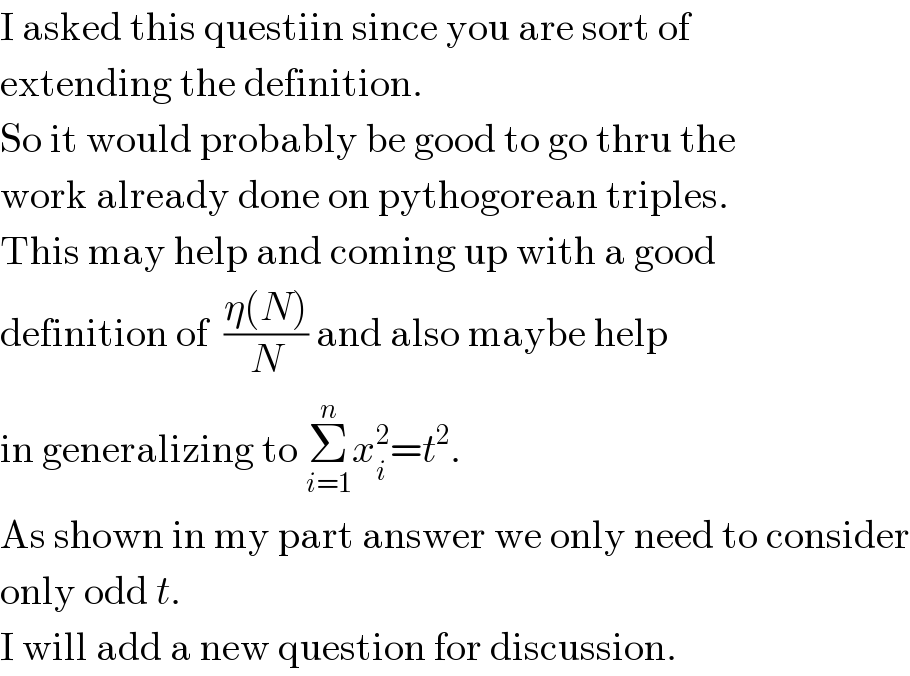
$$\mathrm{I}\:\mathrm{asked}\:\mathrm{this}\:\mathrm{questiin}\:\mathrm{since}\:\mathrm{you}\:\mathrm{are}\:\mathrm{sort}\:\mathrm{of} \\ $$$$\mathrm{extending}\:\mathrm{the}\:\mathrm{definition}. \\ $$$$\mathrm{So}\:\mathrm{it}\:\mathrm{would}\:\mathrm{probably}\:\mathrm{be}\:\mathrm{good}\:\mathrm{to}\:\mathrm{go}\:\mathrm{thru}\:\mathrm{the} \\ $$$$\mathrm{work}\:\mathrm{already}\:\mathrm{done}\:\mathrm{on}\:\mathrm{pythogorean}\:\mathrm{triples}. \\ $$$$\mathrm{This}\:\mathrm{may}\:\mathrm{help}\:\mathrm{and}\:\mathrm{coming}\:\mathrm{up}\:\mathrm{with}\:\mathrm{a}\:\mathrm{good} \\ $$$$\mathrm{definition}\:\mathrm{of}\:\:\frac{\eta\left({N}\right)}{{N}}\:\mathrm{and}\:\mathrm{also}\:\mathrm{maybe}\:\mathrm{help} \\ $$$$\mathrm{in}\:\mathrm{generalizing}\:\mathrm{to}\:\underset{{i}=\mathrm{1}} {\overset{{n}} {\sum}}{x}_{{i}} ^{\mathrm{2}} ={t}^{\mathrm{2}} . \\ $$$$\mathrm{As}\:\mathrm{shown}\:\mathrm{in}\:\mathrm{my}\:\mathrm{part}\:\mathrm{answer}\:\mathrm{we}\:\mathrm{only}\:\mathrm{need}\:\mathrm{to}\:\mathrm{consider} \\ $$$$\mathrm{only}\:\mathrm{odd}\:{t}. \\ $$$$\mathrm{I}\:\mathrm{will}\:\mathrm{add}\:\mathrm{a}\:\mathrm{new}\:\mathrm{question}\:\mathrm{for}\:\mathrm{discussion}. \\ $$
Answered by prakash jain last updated on 27/Nov/15
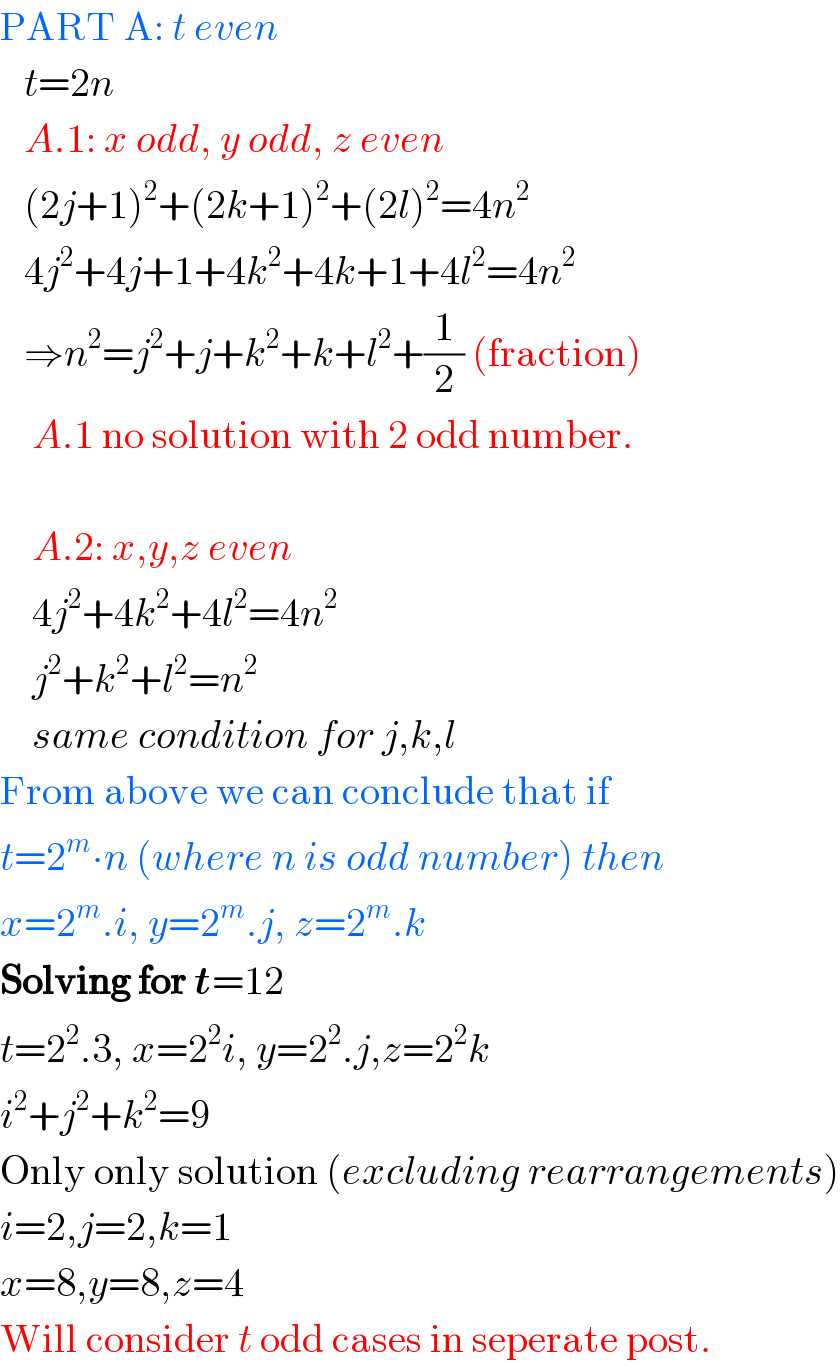
$$\mathrm{PART}\:\mathrm{A}:\:{t}\:{even} \\ $$$$\:\:\:{t}=\mathrm{2}{n} \\ $$$$\:\:\:{A}.\mathrm{1}:\:{x}\:{odd},\:{y}\:{odd},\:{z}\:{even} \\ $$$$\:\:\:\left(\mathrm{2}{j}+\mathrm{1}\right)^{\mathrm{2}} +\left(\mathrm{2}{k}+\mathrm{1}\right)^{\mathrm{2}} +\left(\mathrm{2}{l}\right)^{\mathrm{2}} =\mathrm{4}{n}^{\mathrm{2}} \\ $$$$\:\:\:\mathrm{4}{j}^{\mathrm{2}} +\mathrm{4}{j}+\mathrm{1}+\mathrm{4}{k}^{\mathrm{2}} +\mathrm{4}{k}+\mathrm{1}+\mathrm{4}{l}^{\mathrm{2}} =\mathrm{4}{n}^{\mathrm{2}} \\ $$$$\:\:\:\Rightarrow{n}^{\mathrm{2}} ={j}^{\mathrm{2}} +{j}+{k}^{\mathrm{2}} +{k}+{l}^{\mathrm{2}} +\frac{\mathrm{1}}{\mathrm{2}}\:\left(\mathrm{fraction}\right) \\ $$$$\:\:\:\:{A}.\mathrm{1}\:\mathrm{no}\:\mathrm{solution}\:\mathrm{with}\:\mathrm{2}\:\mathrm{odd}\:\mathrm{number}. \\ $$$$ \\ $$$$\:\:\:\:{A}.\mathrm{2}:\:{x},{y},{z}\:{even} \\ $$$$\:\:\:\:\mathrm{4}{j}^{\mathrm{2}} +\mathrm{4}{k}^{\mathrm{2}} +\mathrm{4}{l}^{\mathrm{2}} =\mathrm{4}{n}^{\mathrm{2}} \\ $$$$\:\:\:\:{j}^{\mathrm{2}} +{k}^{\mathrm{2}} +{l}^{\mathrm{2}} ={n}^{\mathrm{2}} \\ $$$$\:\:\:\:{same}\:{condition}\:{for}\:{j},{k},{l} \\ $$$$\mathrm{From}\:\mathrm{above}\:\mathrm{we}\:\mathrm{can}\:\mathrm{conclude}\:\mathrm{that}\:\mathrm{if} \\ $$$${t}=\mathrm{2}^{{m}} \centerdot{n}\:\left({where}\:{n}\:{is}\:{odd}\:{number}\right)\:{then} \\ $$$${x}=\mathrm{2}^{{m}} .{i},\:{y}=\mathrm{2}^{{m}} .{j},\:{z}=\mathrm{2}^{{m}} .{k} \\ $$$$\boldsymbol{\mathrm{Solving}}\:\boldsymbol{\mathrm{for}}\:\boldsymbol{{t}}=\mathrm{12} \\ $$$${t}=\mathrm{2}^{\mathrm{2}} .\mathrm{3},\:{x}=\mathrm{2}^{\mathrm{2}} {i},\:{y}=\mathrm{2}^{\mathrm{2}} .{j},{z}=\mathrm{2}^{\mathrm{2}} {k} \\ $$$${i}^{\mathrm{2}} +{j}^{\mathrm{2}} +{k}^{\mathrm{2}} =\mathrm{9} \\ $$$$\mathrm{Only}\:\mathrm{only}\:\mathrm{solution}\:\left({excluding}\:{rearrangements}\right) \\ $$$${i}=\mathrm{2},{j}=\mathrm{2},{k}=\mathrm{1} \\ $$$${x}=\mathrm{8},{y}=\mathrm{8},{z}=\mathrm{4} \\ $$$$\mathrm{Will}\:\mathrm{consider}\:{t}\:\mathrm{odd}\:\mathrm{cases}\:\mathrm{in}\:\mathrm{seperate}\:\mathrm{post}. \\ $$
Answered by prakash jain last updated on 27/Nov/15
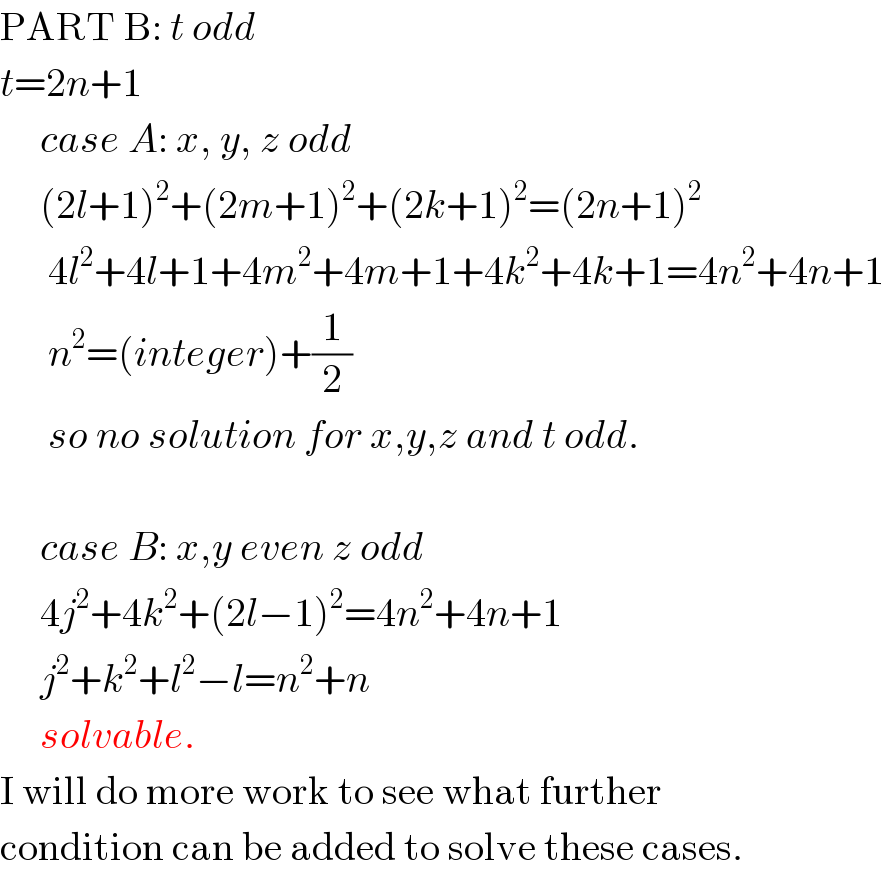
$$\mathrm{PART}\:\mathrm{B}:\:{t}\:{odd} \\ $$$${t}=\mathrm{2}{n}+\mathrm{1} \\ $$$$\:\:\:\:\:{case}\:{A}:\:{x},\:{y},\:{z}\:{odd} \\ $$$$\:\:\:\:\:\left(\mathrm{2}{l}+\mathrm{1}\right)^{\mathrm{2}} +\left(\mathrm{2}{m}+\mathrm{1}\right)^{\mathrm{2}} +\left(\mathrm{2}{k}+\mathrm{1}\right)^{\mathrm{2}} =\left(\mathrm{2}{n}+\mathrm{1}\right)^{\mathrm{2}} \\ $$$$\:\:\:\:\:\:\mathrm{4}{l}^{\mathrm{2}} +\mathrm{4}{l}+\mathrm{1}+\mathrm{4}{m}^{\mathrm{2}} +\mathrm{4}{m}+\mathrm{1}+\mathrm{4}{k}^{\mathrm{2}} +\mathrm{4}{k}+\mathrm{1}=\mathrm{4}{n}^{\mathrm{2}} +\mathrm{4}{n}+\mathrm{1} \\ $$$$\:\:\:\:\:\:{n}^{\mathrm{2}} =\left({integer}\right)+\frac{\mathrm{1}}{\mathrm{2}} \\ $$$$\:\:\:\:\:\:{so}\:{no}\:{solution}\:{for}\:{x},{y},{z}\:{and}\:{t}\:{odd}. \\ $$$$ \\ $$$$\:\:\:\:\:{case}\:{B}:\:{x},{y}\:{even}\:{z}\:{odd} \\ $$$$\:\:\:\:\:\mathrm{4}{j}^{\mathrm{2}} +\mathrm{4}{k}^{\mathrm{2}} +\left(\mathrm{2}{l}−\mathrm{1}\right)^{\mathrm{2}} =\mathrm{4}{n}^{\mathrm{2}} +\mathrm{4}{n}+\mathrm{1} \\ $$$$\:\:\:\:\:{j}^{\mathrm{2}} +{k}^{\mathrm{2}} +{l}^{\mathrm{2}} −{l}={n}^{\mathrm{2}} +{n} \\ $$$$\:\:\:\:\:{solvable}. \\ $$$$\mathrm{I}\:\mathrm{will}\:\mathrm{do}\:\mathrm{more}\:\mathrm{work}\:\mathrm{to}\:\mathrm{see}\:\mathrm{what}\:\mathrm{further} \\ $$$$\mathrm{condition}\:\mathrm{can}\:\mathrm{be}\:\mathrm{added}\:\mathrm{to}\:\mathrm{solve}\:\mathrm{these}\:\mathrm{cases}. \\ $$
Answered by prakash jain last updated on 27/Nov/15
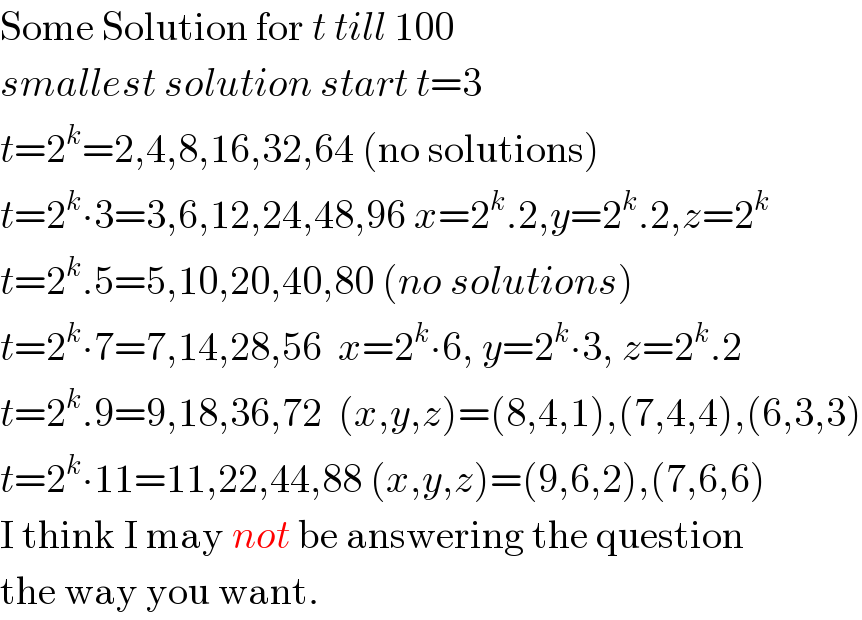
$$\mathrm{Some}\:\mathrm{Solution}\:\mathrm{for}\:{t}\:{till}\:\mathrm{100} \\ $$$${smallest}\:{solution}\:{start}\:{t}=\mathrm{3} \\ $$$${t}=\mathrm{2}^{{k}} =\mathrm{2},\mathrm{4},\mathrm{8},\mathrm{16},\mathrm{32},\mathrm{64}\:\left(\mathrm{no}\:\mathrm{solutions}\right) \\ $$$${t}=\mathrm{2}^{{k}} \centerdot\mathrm{3}=\mathrm{3},\mathrm{6},\mathrm{12},\mathrm{24},\mathrm{48},\mathrm{96}\:{x}=\mathrm{2}^{{k}} .\mathrm{2},{y}=\mathrm{2}^{{k}} .\mathrm{2},{z}=\mathrm{2}^{{k}} \\ $$$${t}=\mathrm{2}^{{k}} .\mathrm{5}=\mathrm{5},\mathrm{10},\mathrm{20},\mathrm{40},\mathrm{80}\:\left({no}\:{solutions}\right) \\ $$$${t}=\mathrm{2}^{{k}} \centerdot\mathrm{7}=\mathrm{7},\mathrm{14},\mathrm{28},\mathrm{56}\:\:{x}=\mathrm{2}^{{k}} \centerdot\mathrm{6},\:{y}=\mathrm{2}^{{k}} \centerdot\mathrm{3},\:{z}=\mathrm{2}^{{k}} .\mathrm{2} \\ $$$${t}=\mathrm{2}^{{k}} .\mathrm{9}=\mathrm{9},\mathrm{18},\mathrm{36},\mathrm{72}\:\:\left({x},{y},{z}\right)=\left(\mathrm{8},\mathrm{4},\mathrm{1}\right),\left(\mathrm{7},\mathrm{4},\mathrm{4}\right),\left(\mathrm{6},\mathrm{3},\mathrm{3}\right) \\ $$$${t}=\mathrm{2}^{{k}} \centerdot\mathrm{11}=\mathrm{11},\mathrm{22},\mathrm{44},\mathrm{88}\:\left({x},{y},{z}\right)=\left(\mathrm{9},\mathrm{6},\mathrm{2}\right),\left(\mathrm{7},\mathrm{6},\mathrm{6}\right) \\ $$$$\mathrm{I}\:\mathrm{think}\:\mathrm{I}\:\mathrm{may}\:{not}\:\mathrm{be}\:\mathrm{answering}\:\mathrm{the}\:\mathrm{question} \\ $$$$\mathrm{the}\:\mathrm{way}\:\mathrm{you}\:\mathrm{want}. \\ $$
